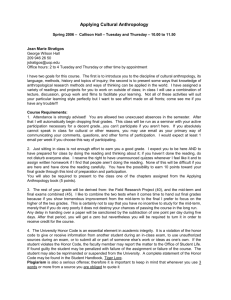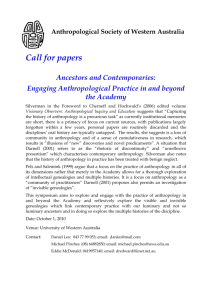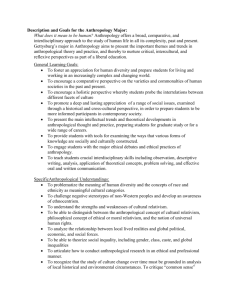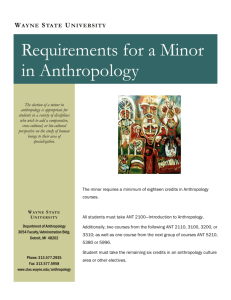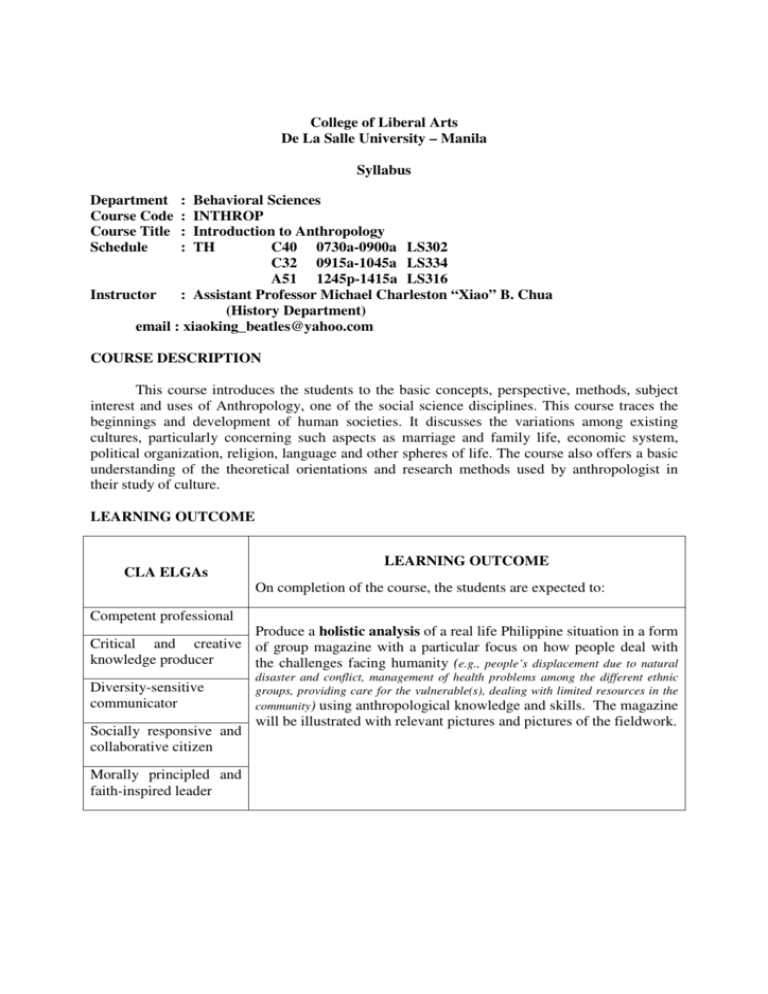
College of Liberal Arts
De La Salle University – Manila
Syllabus
Department
Course Code
Course Title
Schedule
:
:
:
:
Behavioral Sciences
INTHROP
Introduction to Anthropology
TH
C40 0730a-0900a LS302
C32 0915a-1045a LS334
A51 1245p-1415a LS316
Instructor
: Assistant Professor Michael Charleston “Xiao” B. Chua
(History Department)
email : xiaoking_beatles@yahoo.com
COURSE DESCRIPTION
This course introduces the students to the basic concepts, perspective, methods, subject
interest and uses of Anthropology, one of the social science disciplines. This course traces the
beginnings and development of human societies. It discusses the variations among existing
cultures, particularly concerning such aspects as marriage and family life, economic system,
political organization, religion, language and other spheres of life. The course also offers a basic
understanding of the theoretical orientations and research methods used by anthropologist in
their study of culture.
LEARNING OUTCOME
CLA ELGAs
LEARNING OUTCOME
On completion of the course, the students are expected to:
Competent professional
Produce a holistic analysis of a real life Philippine situation in a form
Critical and creative of group magazine with a particular focus on how people deal with
knowledge producer
the challenges facing humanity (e.g., people’s displacement due to natural
Diversity-sensitive
communicator
Socially responsive and
collaborative citizen
Morally principled and
faith-inspired leader
disaster and conflict, management of health problems among the different ethnic
groups, providing care for the vulnerable(s), dealing with limited resources in the
community) using anthropological knowledge and skills. The magazine
will be illustrated with relevant pictures and pictures of the fieldwork.
FINAL COURSE OUTPUT
As evidence of attaining the above learning outcome, students are required to do and present the
following final output on the indicated date of the term.
LEARNING OUTCOME
REQUIRED OUTPUT
Produce a holistic analysis of a real life Philippine
situation with a particular focus on how people
deal with the challenges facing humanity (e.g.,
people’s displacement due to natural disaster and conflict,
management of health problems among the different ethnic
groups, providing care for the vulnerable(s), dealing with
limited
resources
in
the
community)
using
anthropological knowledge and skills.
A group magazine
containing analysis and
will be illustrated with
relevant pictures and
pictures of the fieldwork,
and a related oral
presentation of the process
and the findings on holistic
analysis
of a chosen
Philippine life situation
DUE DATE
13th week
RUBRIC FOR ASSESSMENT (Group presentation)
CRITERIA/QUALITIES
Exemplary
Satisfactory
Developing
Beginning
4.0
3.0
2.0
1.0
Presentation
manifests all the
desired qualities
Presentation
manifests most of
the desired
qualities
Presentation
manifests some of
the desired
qualities
Presentation
manifests little of
the desired
qualities
Content (50%)
The
phenomenon
is
thoroughly
described using adequate evidence;
Main points of the analysis are
thoroughly presented and discussed;
Analysis is holistic and makes use of the
four-field approach;
Competency and ethics in using
anthropological skills are demonstrated;
Broad appreciation of the uniqueness of
their own culture and the diversity of
other cultures is highlighted.
Participation (group members)
(20%)
2
Did everyone in the group contribute in
the preparation and presentation?
Full participation
of all the group
members.
Most of the group
members
participated in the
presentation of the
topic.
Less than half of
the group members
participated in the
presentation of the
topic.
Only one or two
presented and
discussed the topic.
Are the group members all prepared in
presenting the topic?
Shows mastery
of the topic.
Shows gaps in the
presentation of the
topic.
Partially prepared.
Not prepared.
Innovative use of
appropriate
resources.
Uses appropriate
resources.
Minimal use of
appropriate
resources.
No resources used
(e.g., just reading
the report).
Innovative use of
appropriate
references.
Uses appropriate
references.
Minimal use
appropriate
references.
Creativity (30%)
Did the students utilize appropriate
resources?
Did the students use extensive and
reliable references?
of
No references used
or cited.
OTHER REQUIREMENTS AND ASSESSMENTS
Aside from the final output, the students will be assessed at other times during the term by the
following requirements:
Individual assesments: (exams, reviews)
Group outputs: (group presentations, e.g. simulation of archaeological excavation and analysis,
fossil set analysis)
Participation
GRADING SYSTEM
Class requirements/activities
Two individual authentic assessments
Final ethnographic magazine (Final output)
Group outputs / reporting
Class participation, behaviour and attendance
TOTAL
Percentage
40
25
15
20
100
3
Point conversion table
96-100 4.0 Excellent
90-95
3.5 Superior
85-89
3.0 Very Good
80-84
2.5 Good
75-79
2.0 Satisfactory
70-74
1.5 Fair
60-69
1.0 Passed
0-59
0.0 Failed
LEARNING PLAN
LEARNING
OUTCOME
TOPICS
Orientation
Produce
a
holistic analysis Introduction:
ELGAs
of a real life
Transformative learning pedagogy
Philippine
situation with a
particular focus
on how people Concerns, relevance and applications of
deal with the anthropology
challenges facing
Concerns of anthropology
humanity
(e.g.,
people’s
displacement due to
natural disaster and
conflict,
management
of
health
problems
among the different
ethnic
groups,
providing care for
the
vulnerable(s),
dealing with limited
resources in the
community,
etc.)
Characteristics of the discipline;
Relationships with other social
science disciplines;
Sub-fields of anthropology
Relevance and applications of
anthropology
using
anthropological
knowledge and Concept of/Realities about culture and
SESSION
NO.
1st session
2nd – 6th
session
ACTIVITIES
Orientation;
Introductions
Context of
inquiry activity
(Knowing the
social science
disciplines);
Film viewing
and analysis;
Short skit/play;
Lecturediscussion;
Context of
4
skills.
cultural variations
Concept of culture
7th – 13th
session
Definitions and basic features
Components
Types and structure
Attitudes affecting the study of
culture
Variations in cultural systems
Cultural variations
Culture change
Doing research in anthropology
-
Characteristics of the research
process in the social sciences
-
Theory and evidence in
anthropology
-
Ethics in doing research in
anthropology
14th – 19th
session
Ethnographic research and other
approaches in studying
contemporary cultures
Discovering the past through
archaeology
Biological dimension of human behavior
and culture
Genetics and evolution
Primate evolution
The emergence of modern humans
Modern humans and cultural evolution
20th – 23rd
session
inquiry activity
(Defining and
characterizing
culture);
Topic
processing
activity;
Film viewing
and analysis;
Group
presentation;
Lecture
discussion
Context of
inquiry activity
(Garbology;
Analyzing past
cultures);
Topic
processing
activity;
Film viewing
and analysis;
Simulation of
archaeological
excavation and
analysis;
Ethnography;
Lecturediscussion
Context of
inquiry activity
(Instructions for
walking);
Fossil set
analysis;
Film viewing
and analysis;
Lecture
discussion;
5
Final output presentations and Synthesis
24th – 25th
session
Group
presentations;
Synthesis
REFERENCES
Ember, C., Ember, M., & Peregrine, P. (2009). Human evolution and culture: Highlights of
anthropology. (6th ed.). Upper Saddle River, NJ: Pearson Prentice Hall. (major
reference)
Ferraro, G. P. (2012). Cultural Anthropology: An applied perspective. Melbourne, Australia:
Wadsworth Cengage Learning.
Haviland, W. A. (2008). Cultural anthropology: The human challenge. Belmont,
CA: Thomson/Wadsworth.
Kottak, C. P. (2011). Anthropology: Appreciating human diversity. New York: McGraw-Hill.
Lavenda, R. H. (2010). Core concepts in cultural anthropology. Boston: McGraw-Hill Higher
Education.
CLASS POLICIES (Supplementary to the House Rules of Big Brother in class already
promulgated and agreed upon by the body)
1. University rules regarding attendance and dress codes apply as part of the house rules for
this class. Students are encouraged to attend class regularly and to participate in class
discussions and other activities. Coming to class late is discouraged.
2. No paper or written outputs will be accepted from a student who fails to participate or
join an activity in which it is required.
3. No make-up context of inquiry or class exercise will be given. No make-up quizzes will
be given, except for officially excused absences.
4. Use of cell phones, IPods, PSPs and similar gadgets is NOT allowed during class.
5. If a student is requested by the professor to leave the room because of misbehaviour, s/he
must report to the discipline office and follow the procedure regarding class offenses.
6. It is the responsibility of the student to initiate consultations with the professor following
the above mentioned contact details and consultation hours.
7. Students automatically get a grade of 0.0 for the course for the following offenses:
cheating of any kind (e.g., in exams, plagiarism in writing and other forms) and absences
in excess of the required limit.
6
Noted by:
DR. ROMEO B. LEE
Chair, Behavioral Sciences Department
DR. JULIO C. TEEHANKEE
Dean, College of Liberal Arts
7





